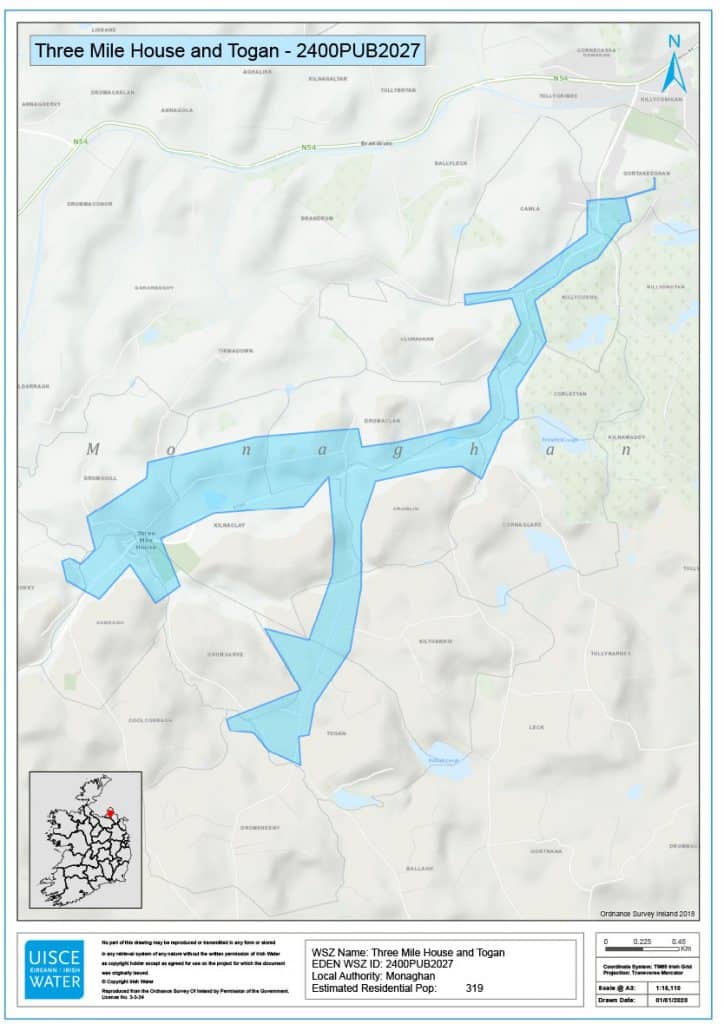Irish Water and Monaghan County Council wish to advise Consumers on the Threemilehouse & Togan Public Water Supply scheme that ongoing operational and mechanical issues at Togan water treatment plant have resulted in elevated levels of manganese being detected. The public drinking water quality is considered to be considerably compromised and an immediate risk to your health.
As a result, and following consultation with the Health Service Executive (HSE), Irish Water and Monaghan County Council are issuing a Do Not Consume Notice with immediate effect to protect the health of all consumers on this scheme. This Do Not Consume Notice applies to all customers served by the Threemilehouse and Togan PWS and as indicated in the blue areas of the map.
IMPORTANT: Boiling your water will not render it safe to drink.
Monaghan County Council and Irish Water apologises for any disruption caused.
Please note:- This notice does not apply to Households and businesses connected to Stranooden Group Water Scheme.

Manganese in Drinking Water – Frequently Asked Questions
 Drinking water is sometimes tested for the presence of metals.
Drinking water is sometimes tested for the presence of metals.
Metals can be present in drinking water but they are subject to specific legal limits.
Manganese is an example of a metal that can be found in drinking water.
The following Frequently Asked Questions have been developed to give you more information if high levels of manganese are found in your drinking water (whether you are on a public or private water supply).
- What is manganese?
Manganese is a silver-grey metal that occurs naturally in soil, water and rocks.
It is used mainly in the manufacture of iron and steel. It is also used in products such as fireworks, paints and cosmetics.
It is an important element in our diets and small amounts are necessary for good health.
- How can I be exposed to manganese?
Our greatest exposure to manganese is usually from food. Nuts, grains, beans and tea are rich in manganese.
How does manganese get into drinking water?
Manganese is found naturally in many surface water (lake and river water) and groundwater (underground water) sources. Water passing through soil and rock can dissolve minerals containing manganese. This is the most likely source of manganese in drinking water.
- What is the acceptable level of manganese in drinking water?
In Ireland, the European Drinking Water Regulations 2014 have set a limit of 50 µg/l (micrograms per litre) because, above this, manganese can affect the colour (appearing black-ish) and the taste of the water. It can also stain laundry and plumbing fixtures.
Drinking water will generally become unpalatable (discoloured with an unpleasant taste) at levels above 50 µg/l which will deter you from drinking it.
High manganese levels in drinking water can be a risk to health. Some groups in the population are more vulnerable such as babies in the womb, infants and young children. New scientific studies show that high manganese levels in drinking water may have a harmful effect on the nervous system and brain development.
Therefore, it is advised that you should not drink water with manganese levels above 120 µg/l.i
This limit is intended to protect everyone in the population, and is based on the most vulnerable such as babies in the womb, infants and young children.
- How would I know if there is manganese in my drinking water?
The only way to know if you have high levels of manganese is to test your water.
If your drinking water is tested for manganese, you should be aware of the result.
At levels above 50 µg/l, manganese can cause an unpleasant taste in drinking water and can stain laundry and plumbing fixtures (black colour).
- How might manganese affect my health?
Exposure to high levels of manganese can affect the nervous system.
A condition called manganism that resembles Parkinson’s disease has been reported in metal workers and smelters who were exposed to very high levels of inhaled manganese at work.
Scientific research shows that drinking water with high levels of manganese may pose a health risk with recent international studies suggesting that it may affect the nervous system and brain development in children.
- Who might be at higher risk of health effects?
Infants and young children seem to be more vulnerable to the potentially harmful effects of high levels of manganese in drinking water. They absorb more manganese and their bodies are less able to remove it.
Babies in the womb, pregnant women and breast-feeding women are also considered to be more susceptible.
Other vulnerable groups include people who are anaemic (i.e. low levels of iron in their blood) – more manganese is absorbed when the body has low levels of iron – and those with liver disease and the elderly.
- What is the HSE’s health advice on manganese in drinking water?
It is advised that you should not drink water with manganese levels above 120 µg/l.[i]
It is likely that the water will not be palatable at these levels anyway. In general, drinking water becomes discoloured (black-ish) with an unpleasant taste at levels above 50 µg/l (legal limit). This will deter you from drinking it.
- The risk of health effects is greater for certain vulnerable groups (as set out in question 7). If you are in one of these risk groups and especially if you are pregnant, breastfeeding or if you care for an infant or young child (particularly if their feeds come from formula or baby foods made up with tap water), you should not drink water with manganese levels above 120 µg/l. You are advised to use an alternative drinking water source or install appropriate treatment to remove manganese from your water.
- For adults and older children who are not in the risk groups set out in question 7, drinking water with manganese levels slightly above 120 µg/l for short periods of time is unlikely to cause negative health effects. Nonetheless, if your drinking water is found to contain high manganese levels, you should contact the agencies as outlined in questions 9 and 10 who will provide you with further advice.
- What happens next?
- Further sampling of your drinking water may be required.
- If you are on a public supply, Irish Water will advise you.
- If you are on a private regulated supply, you can contact your Local Authority for advice.
- If you are on a private well, you can also contact your Local Authority for advice.
- You may have to consider using an alternative drinking water supply or installing appropriate water treatment.
- Where can I get further advice?
- Irish Water
https://www.water.ie/water-supply/water-quality/parameters/
- Environmental Protection Agency
- Your local County or City Council
https://www.lgma.ie/en/irish-local-government/
- Your local HSE Department of Public Health
https://www.hse.ie/eng/services/list/5/publichealth/publichealthdepts/contact/phoffices.html
- Your local HSE Environmental Health Service
- Your GP if you are concerned about existing health problems or symptoms
[i] The HSE has taken a precautionary approach that is in line with that adopted by Canadian health authorities which have recently revised their guidance taking into account the most recent scientific studies. The limit of 120 ug/L is intended to protect everyone in the population, and is based on those who are most vulnerable such as infants and young children. https://www.canada.ca/en/health-canada/services/publications/healthy-living/guidelines-canadian-drinking-water-quality-guideline-technical-document-manganese.html